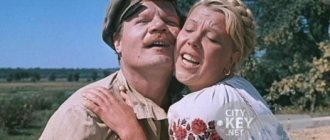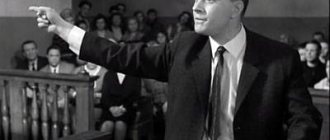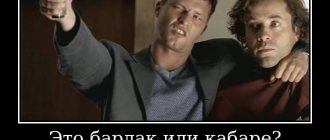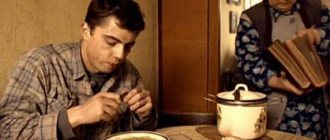[edit] Special, Gaidaev's magic
Those who have thoughtfully read the play “Ivan Vasilyevich” (don’t worry, we know it’s not) should remember that this play is a rather caustic anti-Soviet satire. In terms of its pH level, it is close to “Heart of a Dog,” although it is not written as thickly (but this does not mean that you have to dive into the depths of the CPGS to find the essence, the essence is there on the surface). For those who have forgotten: recently (in this particular case, “recently” means “20 years ago”, since the play was written in 1934-1936 and the events in it take place in the same years, and not in the 70s, so something!) several revolutions died down. All the kitties, who under the old regime were the leaders of the nobility under the new, Soviet government, are simple dicks, serve at best as clerks in the registry offices of Mukhosran and really don’t like being reminded of their origin, because this is fraught with revenge from the working class. Bunsha is just one of these “former” ones, in his new life he voluntarily and forcibly became the manager of the cook’s children’s house (and it’s a shame, and you have to constantly watch so that some fucked-up woman doesn’t burn the house down... And the profit from the position is zero: this It’s not for you these days to fuck up capital repair savings at the HOA). Previously, the fact that he is a born nonsense was a reason for flurodross, now it is a reason to worry about the integrity of your anal ass and hide the origin, and here you are constantly being fucked by him - you can imagine how a “reformed” fellow house manager is bombed. Even after sitting on the royal throne, he continues to deceive... until VODKA appears! This is where the mug of the former VIP comes out: how you bastard with the Tsar, you stink!.. bring here the Tsarina in hare’s kidneys!.. and other children of revelry. The bottom line is a typical thought for Bulgakov’s satire: no amount of revolutions can change human nature. In general, this is what his other “Dog Balls” and “Zoyka’s Apartments” are about. It is not surprising that the production was canceled right at the dress rehearsal. Because fuck it! Thirty years pass, Gaidai appears, and WITHOUT CHANGING ALMOST A SINGLE REPLICA with a poker face, he makes magical passes with his hands. And before the eyes of the amazed public, terry anti-Soviet trousers turn... into Soviet comedy shorts for family viewing! Can you do that, %username%?
[edit] Notes
- Yuri Yakovlev - Ivan the Terrible and part-time Ivan Bunsha - was a fan of Spartak Moscow. Therefore, he gave a second meaning to the words “demonic clothes” addressed to the Dynamo uniform. This phrase is still used by Spartak players to troll the Blue and Whites.
- The degree of Shpak’s wealth can be determined by the fact that, unlike him, he had not a black and white, but a Rubin color TV, perhaps this is also an advertisement because people bought color TVs until the end of the 70s, somehow it was not very good, the quality and almost complete lack of color broadcasts on the USSR Central Television
| [ + ] “Ivan Vasilyevich is changing his profession” goes well with popcorn and Coca-Cola. | |||||||||||||||||
| |||||||||||||||||
| [☭ ] | |||||||||||||||||
| |||||||||||||||||
[edit]Also
[edit] Historical details
- It is possible to determine with high accuracy exactly what time the heroes ended up in (as well as Bunshi’s age, if we assume that he and the “then” Grozny were about the same age, which is logical, given their similarities). Marfa Vasilyevna Sobakina was the wife of Ivan the Terrible for only 15 days - from October 28 to November 13, 1571. It is puzzling that in those distant years there was already real winter and knee-deep snow (lurkai w: Little Ice Age). And also the fact that Marfa Vasilievna does not look like she died from an unknown illness just 15 days later.
- The Crimean Khan Davlet-Girey not only played pranks on the Izyum Highway, but burned Moscow in May of the same 1571.
- The song “That not a strong cloud has clouded over” was written almost a year AFTER the events described, when the Crimean Khan, inspired by the success of 1571, decided to repeat the raid and finally suffered an epic failure (after the Battle of Molodi, at most 10% of initial number of Crimeans).
- For some reason, archers of the 16th century run around with bows. Although they should with self-propelled guns. Actually, the “demons” were supposed to be riddled with bullets. On the other hand, even in the 17th century, the weapons of many servicemen were “saadak guns,” that is, a quiver and arrows.
- After the Swedish ambassador demanded the Kem volost, the clerk announces that the Golden Horde prince Edigei himself is asking to see the tsar, which looks a little strange. The Prince of the Golden Horde asks for an appointment with the Moscow Tsar. However, 60 years before the events described, Prince Edigei died a little.
- A trifle: the heroes in an amicable way should not have even understood each other purely linguistically, because the ancient Russian language was strikingly different from the modern one, which was formed at least a hundred years later. So Miloslavsky’s phrase “Where did the secretary go” in front of a crowd of archers would give them away.
[edit] Film details
- The film's original title was "Call of Time."
- The surname Shpak (Belarusian “starling”) was the nickname of one of the Golitsyn princes, who took with Grozny everything that in the film “Grozny took, except Shpak.”
- The Miloslavskys (not to be confused with the Mstislavskys) are in fact not princes, but Moscow nobles who achieved success already under the Romanovs, having slipped one member of their family into the tsar’s wife. No longer the formidable one, but the Quiet One.
- The hero of Bulgakov's play, engineer Timofeev, was actually named Nikolai
.
The name Alexander
was given to Demyanenko’s hero by Gaidai himself in order to continue the famous film series about Shurik from “Operation Y”. - There are still rumors circulating online about Gaidai, who starred at the beginning of the film as a lighting designer. In fact, those who knew the director personally will understand that these people have nothing in common.
Product placement once and twice
- Kuravlyov's hero, Miloslavsky, promoted two things twice during the film - Sberkassa in the scene of the robbery of Shpak's apartment [2] and a Marlboro smoke - during a song at a meal. But then, although there was such PR, it was, naturally, not in Sovka. Therefore, no money was paid for this.
Unfortunately, there is no “Anisova”...
- And Shurik promoted Stolichnaya (which Klyushnitsa made
). It is unknown whether this was a coincidence, but just two years earlier the rights to the trademark were sold to Pepsi in America. Perhaps in this way they tried to increase sales of this harsh drink (the film was released in the same year, 1973), because in Bulgakov’s original work the tsar drank some kind of beet tincture “Mountain Dubnyak”. - In the play, Bunsha and Miloslavsky dance the rumba; in the film, the house manager asks them to sing something modern, “Tili-tili, trali-vali
. - In the royal feast scene, the prop masters laid out papier-mâché dishes on plates. Gaidai opposed this. Having spent his own 200 rubles (the average salary in the USSR was 160 rubles), the director brought real treats to the set, including sturgeon, incredible at that time. However, when the royal feast was filmed and the film was developed, it was discovered that someone had left a bottle of Borjomi on the table. The feast had to be completely re-shot.
- In a normal film script, one artistic stretch is acceptable (Google the term Suspension of disbelief). The remaining scenario moves should be a logical consequence that appeared with the acceptance of this assumption. In “Ivan Vasilyevich” there are two of them - “suppose that Shurik fell asleep and dreamed of the 16th century” and “suppose that Ivan Vasilyevich Bunsha looked like Ivan the Terrible.” This characterizes the script as banter - Gaidai liked to make intentional blunders in his films. Because Gaidai is a master of banter. It should be noted that in Bulgakov’s original text there is no second stretch - Ivan Vasilyevich has a noble origin, which he hides.
- Bulgakov has a play “Bliss,” which begins in exactly the same way as “Ivan Vasilyevich,” but the characters end up not in the past, but in the future.
- At the 45th minute of the film, one of the men seeing off the army holds a cigarette in his teeth (a grandfather in white clothes). This is what digital technology brings
- The scene of the archers chasing demons was filmed in the Rostov Kremlin.
- The film was slightly subject to Soviet censorship. In the scene of interrogation by a policeman, the tsar, according to the original scenario, answered not “In the wards” but “Moscow, the Kremlin”;
- In the scene of the royal feast, to Bunshi’s question: “Who will pay for the banquet?”, Miloslavsky answered “The people, father, the people!”
- A short scene where the Tsar is frying meat in Shurik’s kitchen was thrown out.
- Initially, Bunsha, at a meeting with the Swedish ambassador, said “Peace, friendship” (evident from the articulation). The censorship replaced it with the winrar “Hitler kaput”, which only benefited the film.
- The scene of the final chase for Miloslavsky was longer - the police did detain him on the river bus. The cut fragment was subsequently used in the short film Black Gloves.
Changed profession
- Ivan the Terrible and Bunshu were played by the same actor - Yuri Yakovlev. Here you can see excellent acting skills, because Bunsha and the king are completely different people in character and temperament. In those scenes where they were both in the frame, combined shooting was used. By the way, they paid him for 2 roles, that is, 2 times more than the others.
- Initially, Yuri Nikulin was planned for the role of Ivan Vasilyevich. According to Gaidai, he was ideally suited in temperament and
. However, after reading the script, Nikulin refused. It's a pity. By the way, Vitsin and Evstigneev were also rejected. - The same garbage with the role of Miloslavsky: initially Gaidai wanted to give this role to Andrei Mironov. Fail.
- The film was released in America under the title: “Ivan Vasilyevich: Back to the Future.”
- In Bulgakov’s original text, “Kemsku Volost” is conveyed to the Swedes by Georges Miloslavsky, which additionally characterizes this hero as an ordinary apartment thief. However, Gaidai in his film turns the emphasis 180 degrees, and makes the social activist Bunshu a “squanderer of state lands,” and the criminal Miloslavsky receives the aura of a “statist.” This substitution greatly played into the hands of the further development of the cult of “thieves’ romance” in Russia.
- Also interesting is the fact that Shurik himself lives on the 7th floor, and the disappeared wall opened a passage to the “white stone chambers”, which were up to a maximum of the third floor. In the film, however, no particular attention was paid to the fact of moving in space, therefore, Shurik poked his machine at random and it, indeed, can open a portal at any time and in any space, to the envy of Dr. Brown.
[edit] Tributes
- The Agatha Christie group has a video for the song “Fairytale Taiga” (1994), where, according to the script, the main characters meet in an old cinema 20 years later and watch this film. The plot of the video was not chosen by chance: the melody of “Fairytale Taiga” is a paraphrase of the main theme of the film “To Meet with Love,” which the author of the song, Alexander Kozlov, never hid.
After all, there were near-vinar precedents...
- In January 1998, the musical “Old Songs about the Main 3”, dedicated to songs of the 70s, was released. In it, the main characters meet at the festive table and congratulate the audience on the New Year. By the time of filming, Savely Kramarov (secretary Feofan) had already died, and Alexander Demyanenko (Shurik) would die in August next year. But this is simply a New Year's skit with elderly actors, so no need to talk about sad things.
- And the Ulan-Ude group “Orgasm of Nostradamus” has a cover of this composition...
- In 1977, the concert film “These Incredible Musicians, or Shurik’s New Dreams” was released with songs from L. Gaidai’s films. In which the artists from these films open their mouths to the soundtrack, hammer on the piano keys, puff out their cheeks, putting their lips to the trumpet, etc.
- Not exactly a tribute, but the wine song “The January Blizzard is Ringing”, which was in the OST for Ivanvasilich, was covered by Vanila sky, wine, if only because the racial pasta singers sing this song in Russian, some passages even without an accent, and in the chorus they have Kirkorov .
- Also, in 2021, the vile former bank kosherly brought Miloslavsky back to life.
[edit] And more
I want to be a king!
In July 2007, Vladimir Etush (the actor who played the role of Shpak), just like his hero, was robbed. At the police station, where he came with a statement, they caught a bunch of lulz. Why, the police - every second comment on the news on all resources was “three tape recorders, three movie cameras...”, and every third - “the dog promised to come with the police.” However, Etush himself did not share such irony with anyone at that time.
But another lulz is that after the theft, after some time the thieves returned the stolen goods. It turned out that the mother of one of the thieves was an ardent fan of Etush and forced her negligent son to return everything, and even apologize in writing. And then they tied up the son himself, yes.
[edit] And finally...
As it turned out, someone (with the consent or on the instructions of Gaidai) was simultaneously copying the film onto 8 mm film, which, according to legend, was intended “for people” to watch at home. A clumsily edited, 12-minute short film entitled “Black Gloves,” telling the story of Miloslavsky’s adventures, recently appeared on YouTube, here is the original version (without sound). What is important is that the short film included many shots, takes and scenes that were not included in the “big film”. For example, a completely different scene of Miloslavsky’s arrival at Shpak’s apartment; or what happened to Miloslavsky after escaping in a medical gown (not shown at all in the big film). Recommended viewing for all film fans.
[edit] World Sci-Fi Top-30
On the IMDB website in the section “Rating of science-fiction (not quite realistic, yeah, yeah) films” the subject exists in the Top-30. Epic win!
[edit] And at the very end
On November 30, 2013, Yuri Yakovlev, who played the role of Ivan the Terrible, died. Goodnight, sweet tsar.
[edit] Plot
That same shot: “And they will cure me” The Tsar’s desire is the law Captain Picard is done
Alexander Sergeevich Timofeev (the same Shurik) has long graduated from college and works as an engineer-inventor. During this time he created a time machine. The wife (according to the actress - the same Lida, who, however, managed to change her name to Zina), accordingly, is not satisfied, and she decides to go to the director Yakin. One day, inspired by watching the opera “Boris Godunov” on Zomboyashchik, Shurik decides to open a portal to the past. But he doesn’t go there himself, but sends two suckers: the building manager, Ivan Vasilyevich Bunsha, who has bothered all the residents of the entrance, and the apartment thief, “friend of Anton Semenych Shpak” - Georges Miloslavsky.
However, the walk turned out to be short-lived: a breakdown occurs (transistors burn out) caused by a reed stuck in the car. (In the play, Miloslavsky and Bunshu are thrown into the past after the rash actions of the building manager, who, trying to turn off the car, pokes buttons at random and pulls out the start key from the car. Thus, Timofeev has to look for a locksmith to make a new key). The characters get confused: the king ends up in our time, and the exiles end up in the 16th century. While the fugitives are hiding from reprisals and transforming into a king and a prince, Grozny and Shurik kick dicks, drink vodka and talk about scientific discoveries.
Since the characters of Bunshi and Ivan the Terrible are completely opposite, Georges took the initiative. He orders the Crimean Khan to be driven out of the Izyum Road, and Bunsha signs his decree as “and. O. Tsar" (considering that subsequently "the army rebelled. They say the Tsar is not real!", one can draw the logical conclusion that it was the signature that confused the faithful governors). Georges straightens Bunshe's brains when he wants to give the Kem volost to the Swedes, trolls clerk Feofan for his adherence to the regime, steals the Swedish ambassador's breast medal and, tired of it, eats royally with the boyars. The liar Bunsha, having knocked over a couple of goblets and tasted simple black caviar, begins to be frivolous and starts dancing with the queen’s hay girls. The couple behaves simply and unmannerly, but in the opinion of their ancestors, too modern, thereby arousing suspicion among the guards and the ordinary Russian people crowding under the windows that the real Tsar was kidnapped by demons.
Meanwhile, Shurik runs around the radio equipment stores of the 1970s in search of these damn transistors for the car, where, according to the law of meanness, there are always recounts, repairs and shortages. The Tsar sits in his “mansion”, eats sprat, washed down with Stolichnaya, listens to Vysotsky, supports Dynamo[1] and admires Moscow without traffic jams from the balcony. Suddenly Zina returns with Yakin’s suitcase, followed by Yakin himself, and the drama begins. Everything would have worked out fine, but Yakin dragged in some damn Godunov (Boris the Tsar). Here the Tsar simply comes out from behind the curtain and gives Yakina the Tsar’s staff to punish her for her disrespectful attitude towards herself, for Godunov and for her dislike for the noblewoman Zina! Yakin, having sharply changed his political orientation and become a patriot and monarchist, is studying the ancient Slavic language dry. After torturing Yakin, the Tsar notes that Zina’s eyebrows are allied, and he says to Yakin: “a stinking dog,” gives them his blessing and sends them to these very Gagras. Unfortunately, Grozny is being fired upon by his wife Bunshi, a complete bitch and an emancipator. From a nearby balcony, she declares Tsar Ivan the Terrible an alcoholic and calls the police along with people in white coats.
Fleeing from the oncoming Streltsy, Miloslavsky and Bunsha retreat back to their era, taking advantage of the fact that Shurik has already repaired the time machine. The cops quickly and decisively tie up first one, then the second king. Georges, disguised as a doctor, escapes from Timofeev’s apartment, and the inventor himself manages to return Grozny to the 16th century.
(And in fact:
all the events of the film are just Shurik’s dream. The fact is that he increased the voltage in the machine and it exploded, so much so that Shurik lost consciousness (in Bulgakov’s original these were real events, but in the censored edition Timofeev was so exhausted debugging his machine that he simply fell asleep). Zina did not go to Yakin, he did not catch the cat in the royal chambers, and there was no Georges Miloslavsky. Although he did receive pussy for blown traffic jams from the Bunsh couple...
)







